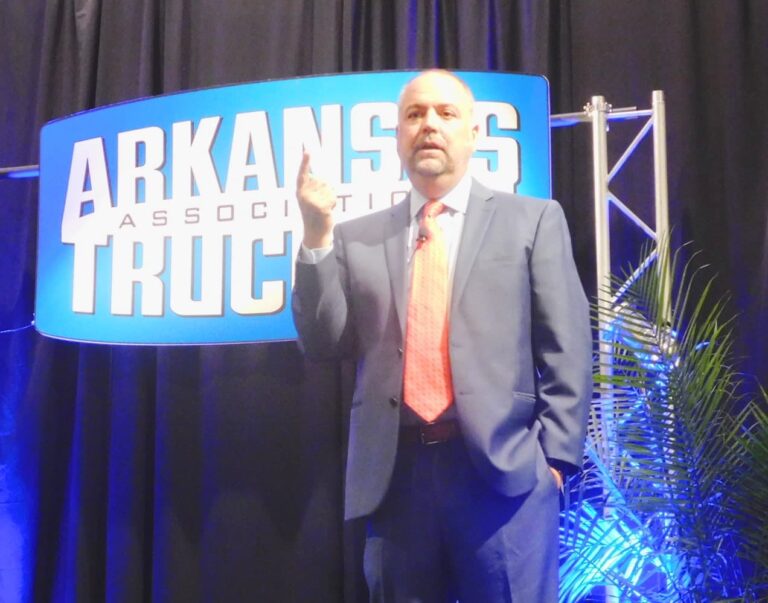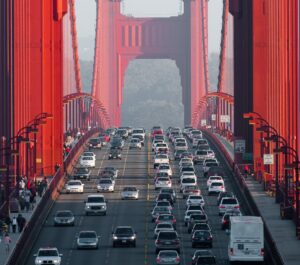We’ve all experienced it. You’ve been driving 70 mph for a while. Suddenly, you’re forced to slow down to 45 mph. It feels like you are crawling, even though a part of you knows if you were going this fast on a residential street, you’d feel like you were blazing.
Bob Costello, chief economist and senior vice president of international trade policy and cross-border operations for the American Trucking Associations, has noticed that a lot of people in trucking are having a similar sensation when they look at the economic health of the industry.
Costello was in Little Rock, Arkansas, May 15 for the annual Arkansas Trucking Association Business Conference and Vendor Showcase to give his perspective on the current state of the economy and the industry.
Everywhere he goes these days, Costello told the crowd, everyone keeps asking, “Are we headed to a recession?” After all, things definitely slowing down.
“I don’t believe that, folks,” Costello said flatly. “However, we have to reset our expectations. What I say is, we’re slowing, but we’re still growing. We have some reduced momentum. We are headed back to trend.”
The biggest problem about 2019 is it came after 2018, and 2018 was a hard act to follow.
“The big mistake is to look at year-over-year comps,” Costello said. “Those are not going to be good because 2018 was so good.
“Instead, take a more long-term look at where we were compared to several years ago and what direction we are heading. We may not be skyrocketing like we did for about a year and a half, but we are still moving upward, albeit at a more normal pace.
“Really, we’re in a decent spot. It’s not going to be 2018. But it’s certainly not going to be terrible, either.”
Costello said he wouldn’t expect a recession until 2021, at the earliest. Part of that is because the Federal Reserve has said they were going to put interest rate hikes on pause.
“Economic expansions do not die of old age,” Costello said. “They’re usually murdered.” And the Fed is often the culprit, but this time their restraint has come in time to hold off a recession.
That’s not to say there’s nothing to worry about, he added. Gross domestic product took an upswing in the first quarter of 2019, Costello said, up 3.2%. That sounds good, until you consider that it was inflated by retailers stockpiling inventories at the time because of the threat of tariffs against China.
“I talk to retailers all the time,” Costello said. “They were bringing in as much stuff as they could.”
The term gets thrown around a lot, but Costello fears the U.S. is getting dangerously close to a genuine trade war with China. With tariffs going up, everything is going to get more expensive, and you don’t have to be an economic whiz to know what that will do to consumer spending.
Costello expects we’ll see consistent growth in the 2% range for the foreseeable future. Not spectacular, “but it’s still growth.”
Consumer sales is one of the key factors to look at that affects trucking. And one of the key factors in assessing the health of the consumer is to look at the job market. Here, the numbers are so good as to be almost inexplicable, Costello said.
For the past year, the American Job market has added an average of 212,000 a month.
“I don’t know where these people are coming from,” Costello said. You can expect an increase of about 60,000 simply from population growth, he said, “anything above that and you’re finding folks from somewhere.”
Some say it’s people returning to the job market from the recession, Costello said, but that was 10 years ago. Could immigration account for some of it? Maybe a little. But wherever they’re coming from, he doesn’t expect it can continue at this pace. The thing to remember, once again, is once it does, it only means it’s getting closer to normal.
The same could be said for the unemployment rate. It’s now at the lowest it’s been since December 1969. “Do you know we now have more job openings than we have unemployed people?” he said. “It’s been that way for almost two years now.”
Of course, when the job market’s good, salaries go up. And when incomes go up, spending goes up.
Another key indicator for trucking is the housing market. With 1.23 million new homes expected to be built, this is one of the less spectacular aspects of the economic picture, Costello said, but sometimes you have to adjust how you look at the numbers. For starters, millennials are not as concerned about home ownership as previous generations. Also, in a lot of desirable areas, there just isn’t any space left to build.
Another area where the industry needs to look at the numbers differently is inventories. Costello said. With the rise in eCommerce and quicker delivery guarantees, more merchandise has to be out there in the supply chain for local delivery, no matter where “local” happens to be.
“This is the change in the supply chain right here, and it has all sorts of ramifications,” Costello said.
Average length of haul for truckload has gone from nearly 800 miles to 507 miles last year, he said. “And what does that mean for driver pay and how we pay them?” The raises companies have given aren’t making up for those lost miles. How will that affect driver retention and the driver shortage?
“Let’s be honest, the driver shortage is an over-the-road for-hire truckload problem, it’s not the entire industry,” Costello said.
So, there are challenges the industry needs to address, but the overall state of the industry and the economy are still strong.
“If I have to summarize, 2018 was the best year ever, post-deregulation,” Costello said. “I think if you took out last year and historically compared it, we’d be in a lot better mood.”
Klint Lowry has been a journalist for over 20 years. Prior to that, he did all kinds work, including several that involved driving, though he never graduated to big rigs. He worked at newspapers in the Detroit, Tampa and Little Rock, Ark., areas before coming to The Trucker in 2017. Having experienced such constant change at home and at work, he felt a certain kinship to professional truck drivers. Because trucking is more than a career, it’s a way of life, Klint has always liked to focus on every aspect of the quality of truckers’ lives.







